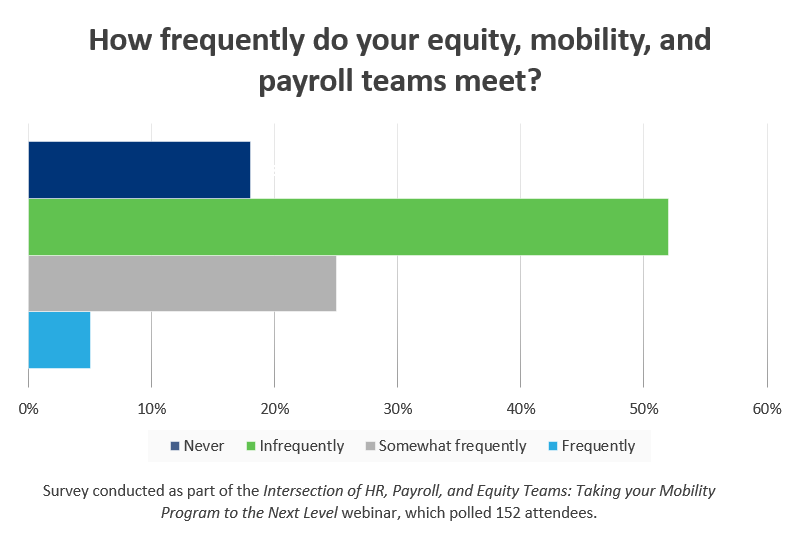
Managing a mobile workforce, especially at a time when many employees are remote, can be complicated. Throw in a number of those employees receiving equity or other long-term incentive compensation and the reporting and withholding challenges likely rise to the top of your “pressing issues” list. Making sure all departments align and collaborate is essential in your efforts to manage a successful equity compensation program.
In late May 2021, two of GTN’s equity tax experts, Tara Hagen and Lynn Carbo, hosted a webinar where they discussed how to bring your equity, HR, and payroll teams together despite the challenges faced in delivering equity incentive compensation to your mobile workforce. You can download a recording of the webinar here: The Intersection of HR, Payroll, and Equity Teams: Taking your Mobility Program to the Next Level
During the webinar, they provided five practical tips and strategies to help you manage your equity incentive compliance obligations while meeting the needs of your business and employees. Below we explore the first of these five strategies – COLLABORATE. Use of these practical collaborative tips will help align your equity, HR, and payroll teams to help better manage your equity compensation program.
Issues when providing equity compensation to a remote or mobile workforce
Understanding the various ways an equity incentive plan can impact your reporting requirements is the first step in determining who you may need to collaborate with to facilitate a successful program. Providing equity or long-term incentive compensation to a remote or mobile workforce can present several significant issues such as:
- Budgetary surprises
- Data and information challenges
- Delivery challenges
- Employee experience issues
- Timing challenges
On top of these potential issues, from a tax withholding and reporting perspective, you may also run into:
- Payroll compliance challenges
- Reporting compliance challenges
- Social security obligations
In general, payroll reporting and withholding becomes more complicated when multiple jurisdictions have different obligations for taxable compensation. Additionally, offering stock options to mobile or remote employees can be especially complex because they are granted, vested, and exercised over several years. During that time, an employee may work in multiple tax jurisdictions, each with its own set of rules.
And income taxes aren’t the only obligations impacted; so are the withholding and reporting requirements for social security obligations. To make matters more complex, these reporting requirements are not linked to just national or federal levels. In the US, for example, there may be state taxes to consider.
When employees work in multiple states during a year, employers can incur additional tax reporting and withholding obligations. The employees may also need to file several state income tax returns instead of just one for their Home state. New York, for example, has separate reporting requirements for employers and employees that often are inconsistent, making tracking the data to accurately prepare W-2s even more challenging without proper systems and communication plans in place.
Regulatory developments across countries also need to be monitored. Staying up to date across all the countries you do business in (related to changes in securities law, foreign exchange, data privacy rules, and labor law) is critical.
Why aligning and collaborating across teams is important
Now that we understand when an employee who receives equity income crosses any border—whether state or country—they create tax reporting and withholding obligations, we also need to understand that these obligations impact multiple teams or departments within an organization. These obligations create different challenges for the equity team than they do for the HR/mobility team and for the global payroll teams. And often each team doesn’t fully understand the challenges and obligations that the other teams face. So all parties have an awareness and understanding of the challenges that arise when equity and mobility converge together, it is very important to align your internal teams.

One of the main issues companies face is knowing where their employees are located. Having frequent collaboration among the equity, HR, and payroll teams can help combat this issue. For example, your HR team may know that someone is relocating to another state that your equity team doesn’t know about. Or, perhaps your payroll department knows that certain employees who once worked at the company headquarters are now working from their home in a different state. Sharing information and reports is a good first step. Conducting a monthly or bi-weekly meeting amongst the various teams that interact with your workforce is even better and will help ensure you have all the information needed to make decisions and ensure a smooth and accurate process.
Additionally, a lot of times these teams are made up of individuals who wear many different hats. Plenty of companies don’t have a formal mobility team so it falls to HR to manage everything. Or perhaps your company doesn’t have a formal equity team and instead those tasks fall to the payroll group. Even more challenging, we often see that each “team” can be made up of just one person to manage it all. When each team is pulled in multiple directions and serves several functions within the company, it can create additional challenges as they don’t have the time or resources to consider all the obligations necessary when they have employees receiving equity in multiple jurisdictions.
How to align and collaborate among the equity, HR, and payroll teams
Departments are often unaware of the intricacies of the company’s reporting needs when employees move—whether on a permanent basis or when their jobs require them to work in multiple jurisdictions. Getting relevant teams together so you can establish a plan, implement a process, and work together to make it successful is an essential first step in managing your obligations.
So where do you start?
First, outline the roles and responsibilities of each team. Understand what information each team has access to, what they need, and then bring everyone together to see the full picture.
- The equity team has responsibility over broker reporting needs including shares for withholding and tax rate.
- The HR/mobility team has responsibility and insight into which employees are moving, where they are moving to, and the length of stay in each location. In addition, this team usually has responsibility to know where employees are currently residing and working and whether new employees are being hired remotely.
- The payroll team has responsibility over the global reporting for compensation and tax withholding.
- Other teams, such as the corporate tax team and finance team, have responsibility over and interest in permanent establishment, transfer pricing, chargebacks, and accruals and should also be brought into the conversations.
Additional tips to help facilitate collaboration:
- Make sure all stakeholders are invited to the mobility tax meetings including the HR team, equity team, payroll team, and mobility tax provider.
- Recognize that your Human Resources Management System data and move reports may not provide you with all employees who should be assessed for mobile equity reporting.
- Gather feedback from global payroll teams to confirm they can execute on equity transaction reporting. This will ensure adjustments can be made to equity tax positions as needed to accommodate local payrolls.
For equity teams that may not have the internal resources and can’t look to outside support, it is often beneficial to cross-train from other teams such as HR, benefits, or payroll. These teams often provide insights and ideas that may not have been thought of before as they often have a different perspective and can be creative with both resources and solutions.
Understand that it truly takes a village to manage the equity compensation of your mobile workforce. Collaborate and align with as many departments within your company as you can to try to get the best understanding of where you have employees and what that means from a tax obligations perspective.
GTN’s equity tax experts, enabled by our Mobile Equity Management solution, help clients manage the equity requirements of their global and domestic cross-border workforce, remote workers, and work anywhere employees. By incorporating best practices and a collaborative methodology to providing services and guidance, we deliver a tailored approach to support clients with managing their equity tax compliance needs.
Schedule a call with one of our equity tax experts for ideas on how we can help you manage the equity requirements for your global and domestic cross-border workforce, remote workers, and work anywhere employees.
See how our equity professionals and robust technology work together to ensure you meet your equity compliance needs:




